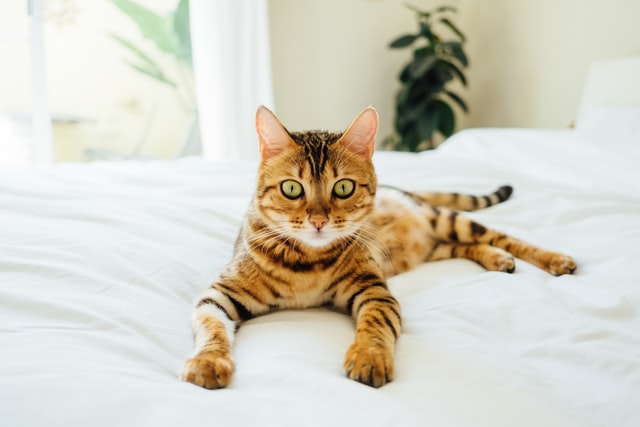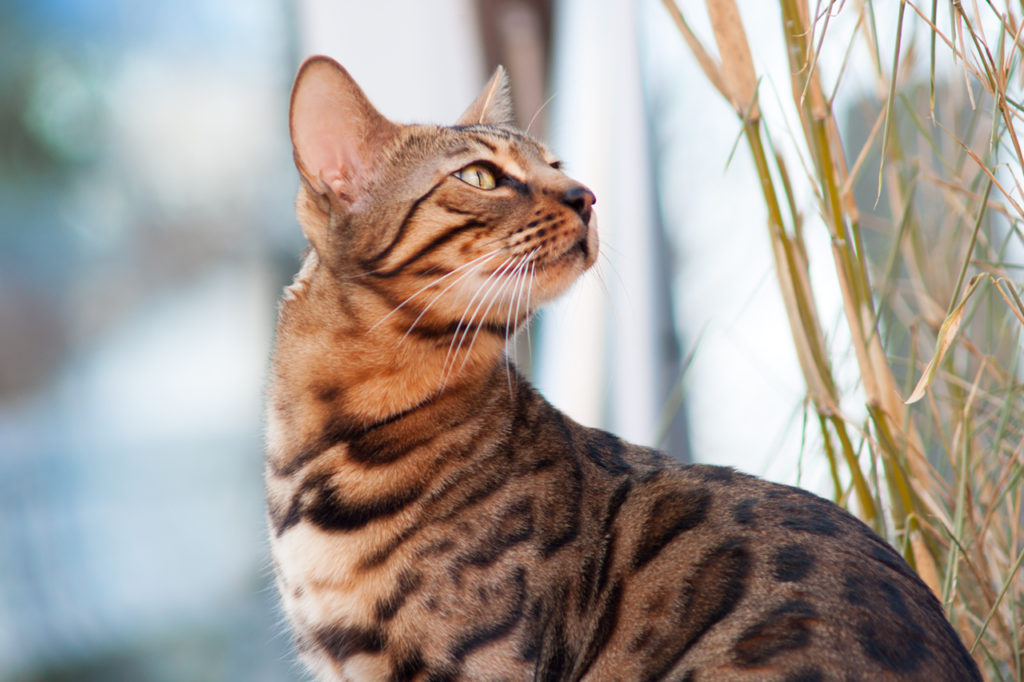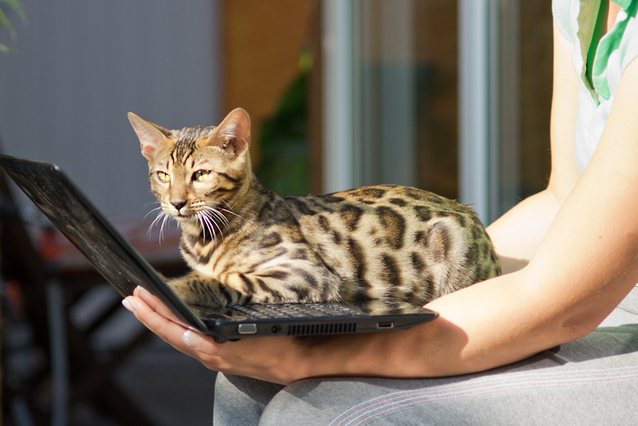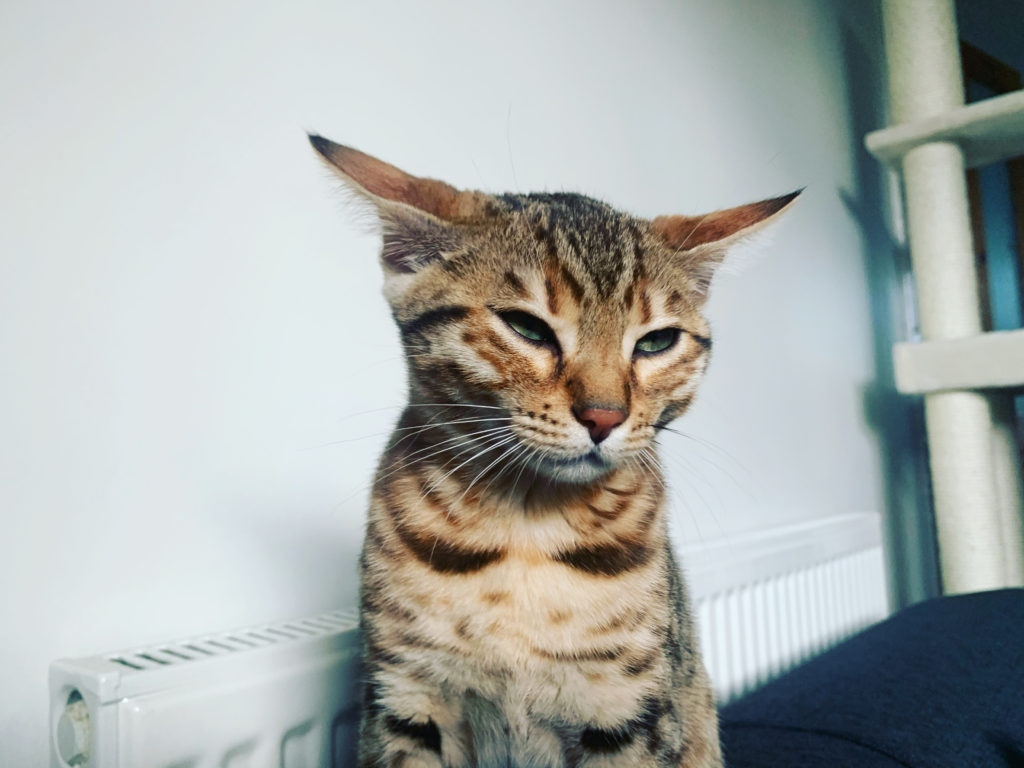Where there is the potential for money to be made, there is the potential to be scammed. Unfortunately the world of breeding and of selling Bengal cats does not escape this truism.
However, you can dramatically reduce your chances of being tricked out of your money or supporting an unethical, ‘Backyard Breeder’ by being aware of and following the below steps.
In fact, this is a list I compiled from contacting genuine breeders and from what I discovered when searching for my own Bengal kitten.
In this post you will learn:
1. To spot some of the main tactics employed by scammers
2. What you should look for in a good breeder and a healthy kitten
3. Specific questions to ask to ensure you buy a Bengal from someone reputable
#1 Price

Why can price be a good indicator of a potential scam?
Because as discussed in the article Prices of Bengal Cats: The Definitive Global(ish) Guide 2021, Bengal kittens are relatively expensive, particularly ‘Show’ or ‘Breed’ Quality kittens.
This is what to consider when you see the price of a kitten:
- An unusually low price is a good indicator that what you may be getting is not a genuine Bengal and instead a cross-breed or even just an animal with no Bengal in it whatsoever. Those unfamiliar with the breed could easily be tricked into buying something that looks Bengal, but isn’t.
- Furthermore, a low price could indicate that the animal has been looked after inappropriately- for example, kept in a cage or fed poor quality food.
- Some unscrupulous breeders will actually try to sell non-Bengal kittens at a higher price to unsuspecting buyers. Therefore, in all cases ask questions about parentage, pedigree (see #4 Pedigree), registration (see #7 Registration) and where possible, visit the seller first.
- It’s common practice to be asked to pay a deposit to secure your kitten of choice and this is usually refundable if the breeder is unable to supply it. Avoid anyone who asks you to pay the whole sum upfront.
#2 Vaccinations
The health of any Bengal you seek to purchase should be in the forefront of your mind.
If a kitten is advertised as not having had any or all of its vaccinations for its age, that should set the alarm bells ringing.
Vaccinations differ according to country/region, (rabies is not required in the United Kingdom for example) so check to see which are recommended in your area and the appropriate schedules for each.
- ‘Core’ vaccines are common throughout many Western countries and are considered essential. These immunise against the following viruses with the first three often given in combination:
- Feline Panleukopenia Virus (FPV)
- Feline Herpes Virus (FHV-1)
- Feline Calicivirus (FCV)
- Rabies (in some countries)
- Another common vaccine is for Feline Leukaemia Virus (FLV). This may be included as standard although some owners decide not to immunise if theirs will be house a cat.
- Ask to see a vaccination card or proof that these have been administered.
#3 Health Checks, DNA Testing and Screening
Remember me saying health should be at the forefront of your mind?
It was in the section before.
About vaccinations.
Many will be familiar with pets needing some form vaccination, but are perhaps less so with screening for genetic abnormalities.

Irresponsible breeders may miss these out due to the cost of having them done.
Make sure you don’t miss out on finding out whether they have or not.
- Bengals require screening for defects that could cause health problems later in life.
- These are for Hypertrophic Cardiomyopathy (HCM), which causes heart failure, Pyruvate Kinase deficiency (PK def) which results in anaemia and Progressive Retinal Atrophy (PRA), a degenerative eye condition.
- Ask to see the results of DNA tests for PK def and PRA (or the results of the parents). This will indicate whether the kitten is negative, a carrier (but not affected by the condition) or has both faulty genes.
- HCM is harder to detect in kittens so ask the breeder whether their adult cats have been scanned and/or whether the kittens are from screened lines.
#4 Pedigree
The untrained eye, i.e. many of us looking for a pet Bengal, may not be able to tell the genuine article apart from a specimen that isn’t.
What does ‘Pedigree’ mean? In this instance, pedigree refers to a record or chart that essentially details the cat’s ancestry or in effect, its family tree.
Some scammers will try to pass off half-Bengals (that’s Bengals bred with another cat breed, not half an animal…) as pure bred knowing full-well some people will be easily fooled and not ask for evidence of their pedigree.
- A Bengal breeder will have a pedigree chart or document that should prove the kittens they have for sale are from a genuine Bengal lineage.
- This should go back around 4 or 5 generations.
- Some breeders may even display this on their website.
- An ‘official’ certificate may not be provided but can usually be obtained from the association the cat is registered with albeit for a fee.
#5 Living Conditions
Humans and animals alike are influenced by their living conditions.
Get things right, and we thrive and have the opportunity to live to the full.

Sadly, some breeders prefer cash over quality of life for their animals, and therefore provide poor conditions for them to live in.
Bengals in particular are highly intelligent animals that need stimulation and space, especially if there aren’t able to roam freely outside.
Always make sure your kitten has been raised well as this will ultimately be reflected in its physical and mental state.
- The only way to be absolutely certain is by visiting the breeder.
- Otherwise use videos or facetime, with the latter reducing the chances of someone sending you a fake video.
- Some Bengals will be house cats or raised by small hobby breeders, others will have access to the outdoors or large outdoor areas. Avoid anyone who keeps their cats in cages.
- One should see the hallmarks of ‘cat living’- toys, food bowls, cat trees, scratching posts etc.
#6 Behaviour and Physical Condition
Living conditions will impact directly on a kitten’s behaviour and health.
If they are substandard or lack some or all of the things outlined in the previous section, then a kitten is more likely to become overly timid or aggressive and simply not make for a good pet.
They may also be malnourished or diseased.
The amount of time the breeder spends with the animal also influences how it will behave.
Look out for the following:
- Any kitten you see should be inquisitive yet shy (but not overly timid) and relatively easy to handle.
- You can observe how the breeder interacts with their cats and how they respond. Are they shy or scared? Do they lash out? Or are they playful? (yes that refers to the cats, not the breeders…)
- The kitten should have a shiny coat that’s in good condition.
- Bright, clear eyes.
- Back-up what you see by asking about the health checks as described in #3 Health Checks, DNA Testing and Screening.
#7 Registration

Scammers will try to convince you they are selling you a genuine Bengal cat.
Genuine breeders can only breed genuine Bengals if they’ve paid for breeding rights.
This requires registration.
Therefore if your cat is not registered, then the owner was not legally entitled to breed the animal.
One sure-fire way of guaranteeing authenticity then, is by obtaining proof of registration.
- The International Cat Association (TICA) is the world’s largest cat registry. If a Bengal cat is pure bred, that is, it comes from a line of pure Bengal cat parents, then this will appear on the TICA registry and/or a national equivalent (see here).
- The owner will have a TICA registration slip.
- You will receive a slip confirming registration once you have purchased your cat or kitten. Some owners will only do so if you have bought a Pet Quality kitten and can prove you have had it neutered or spayed (see #8 A Contract, below).
- This is to protect themselves against you breeding from a cat that was not sold with breeding rights (you would have no proof the kittens were genuine Bengals).
#8 A Contract
Some breeders may ask you to sign a contract before selling you your kitten.
“Why the need for a contract? I’m only buying a cat, and it can’t sign anything,” you may think.
But in fact, this is a good sign.
- A contract may be in place to ensure you have the kitten spayed or neutered within a certain period of time after purchase so that it cannot be used to breed from.
- In return, you will then receive the appropriate registration papers and some guarantee that the kitten is fit and healthy.
- A contract may also confirm that the kitten is insured for a limited period after purchase.
- A breeder who has gone to the expense and time of arranging a contract is serious about things being done properly and is less likely to be trying to scam you.
- Always read through anything you’re asked to sign. Don’t be afraid to question the seller, and don’t sign the contract unless you’re completely happy.
#9 Online Presence
Even a scammer is likely so have some kind of online presence.
This is will be probably be in the form of an advertisement or even a basic website.

Some have even been known to use kitten/cat photographs from the sites of genuine breeders.
There are some things you can do to spot a potential scammer online:
- Genuine breeders will post regular updates of their kittens with photographs and videos that may include the parents. Past litters may also be present (if you know what I mean…)
- Details are important. Does what it say on the advert or site add up/make sense? Are they using the correct terminology? Do they respond to your questions?
- Check their social media pages for feedback and comments. True, these could be potentially faked, but reviews from the same person are likely to be written in the same style/manner. A scammer would have to put a lot of work in to set up multiple fake accounts and make them look genuine.
- Breeders love their cats and love talking about them. This sentiment should come across in spates.
Summary
Buying a Bengal cat should be exciting and also educating.
Sometimes when you hear of scams, it can generate paranoia, which can ruin the experience.
But there’s no harm in being aware, and in the main, it should be pretty clear early on when dealing with someone whether they are genuine or not.
No two breeders are the same so there may be some derivation from the above list, but those we have come across enthuse about their cats and are just as concerned that they go to a good home as you are about buying a healthy, well-bred individual (or two) from them.
If in doubt about anything, ask.
And if still in doubt, simply don’t buy.
Further Reading:




